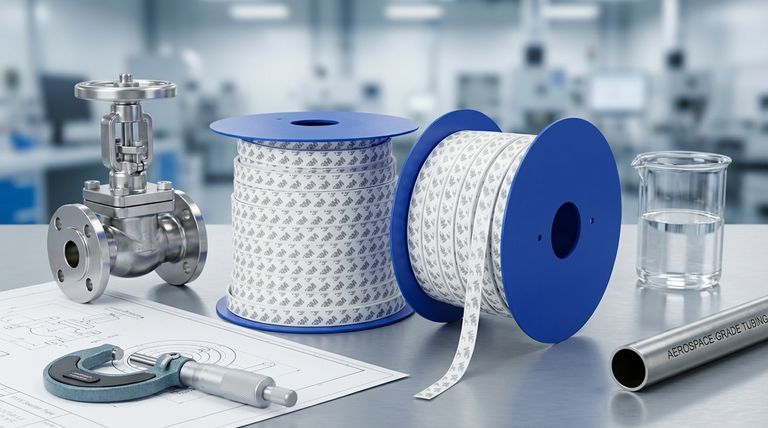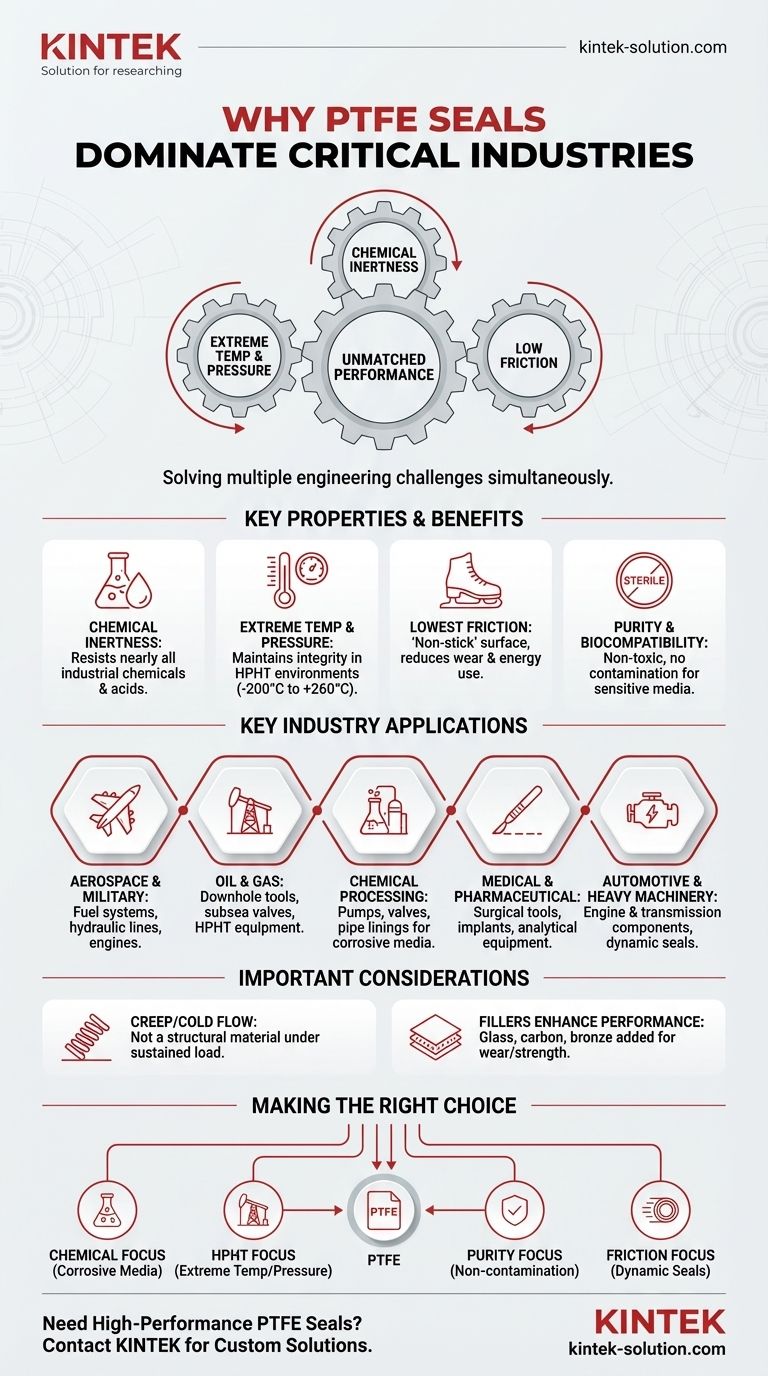To put it simply, Polytetrafluoroethylene (PTFE) seals are the material of choice for the most demanding industries, including aerospace, oil and gas, chemical processing, medical, and automotive. These sectors don't choose PTFE by chance; they rely on its unique and powerful combination of properties—extreme temperature resistance, near-universal chemical inertness, and an incredibly low coefficient of friction—to ensure operational integrity where other materials would catastrophically fail.
The core reason for PTFE's widespread use is not a single feature, but its rare ability to solve multiple engineering challenges at once. It performs reliably in environments that are simultaneously high-pressure, high-temperature, and chemically corrosive.

Why PTFE Dominates in Critical Environments
The selection of a sealing material is a critical engineering decision. While many elastomers and plastics exist, PTFE's fundamental molecular structure gives it a set of characteristics that make it uniquely suited for the most severe service conditions.
Unmatched Chemical Inertness
PTFE is renowned for being one of the most non-reactive substances known. It resists degradation from nearly all industrial chemicals, acids, solvents, and corrosive media.
This property makes it indispensable for the chemical and petrochemical industries, where it's used to seal valves, pipes, and containers holding aggressive substances that would quickly destroy conventional seals.
Extreme Temperature and Pressure Tolerance
PTFE seals maintain their integrity and performance across an exceptionally wide temperature range. They are a go-to solution for high-pressure, high-temperature (HPHT) applications.
This resilience is why the oil and gas industry relies on PTFE for downhole tools and subsea equipment, and why the aerospace industry uses it in engines, pumps, and hydraulic systems exposed to extreme operational heat.
The Lowest Coefficient of Friction
Often recognized by its brand name Teflon®, PTFE has one ofthe lowest friction coefficients of any solid material. This creates a "non-stick" surface that reduces wear and energy consumption in dynamic applications.
This is critical in the automotive industry for engine and transmission components, in food and beverage processing for non-stick surfaces, and in medical devices to ensure smooth, non-reactive operation.
Purity and Biocompatibility
Because PTFE is chemically inert and non-toxic, it does not contaminate the media it contacts. This makes it safe for applications requiring high levels of purity.
The food, pharmaceutical, and medical industries depend on this property for everything from processing equipment and conveyor belts to surgical tools, hematology analyzers, and even medical implants.
A Closer Look at Key Industry Applications
Understanding the material's properties is one thing; seeing how they solve real-world problems provides a complete picture of its value.
Aerospace and Military
In this sector, failure is not an option. PTFE seals are used in aircraft fuel systems, hydraulic lines, engines, and brakes where they must withstand extreme temperature fluctuations and aggressive fluids without degrading.
Oil and Gas
From deep-sea drilling to refinery processing, equipment is subjected to immense pressure and corrosive chemicals. PTFE is essential for sealing components in downhole tools, subsea valves, and HPHT environments, ensuring safety and preventing costly leaks.
Chemical and Petrochemical Processing
This industry handles some of the most aggressive substances on earth. PTFE is used to line pipes and vessels and to seal pumps and valves, providing long-term, reliable containment of corrosive media in power plants, refineries, and chemical manufacturing facilities.
Medical and Pharmaceutical
Purity is paramount. PTFE's biocompatibility and inertness make it ideal for sterile applications like autoclaves, surgical instruments, and analytical equipment. Its non-reactive nature ensures that it won't interfere with sensitive biological or chemical processes.
Automotive and Heavy Machinery
High-wear components in engines, transmissions, and hydraulic systems require seals that can resist heat, friction, and automotive fluids. PTFE seals and gaskets provide the durability and low-friction performance needed for modern vehicles and construction equipment like excavators and loaders.
Understanding the Trade-offs
While incredibly versatile, PTFE is not a universal solution. Effective material selection requires acknowledging its specific characteristics.
It Is Not a Structural Material
Pure PTFE can be susceptible to "creep" or cold flow under sustained load. Its strength lies in its surface properties and resilience, not its mechanical rigidity.
The Power of Fillers
To enhance specific properties, PTFE is often blended with fillers like glass fiber, carbon, or bronze. These additives can significantly improve wear resistance, reduce creep, and increase thermal conductivity, tailoring the seal to a specific application's demands.
Design and Installation Matter
The unparalleled performance of a PTFE seal is only realized through proper engineering design and precise installation. Factors like gland design, surface finish, and operating pressure must be carefully considered to prevent premature failure.
Making the Right Choice for Your Goal
Your application's primary challenge will determine if PTFE is the optimal choice.
- If your primary focus is chemical resistance: PTFE is the industry standard for sealing aggressive and corrosive media where other materials would dissolve.
- If your primary focus is high temperatures and pressures: PTFE is one of the few materials that can maintain seal integrity in HPHT environments common in oil & gas and aerospace.
- If your primary focus is purity and non-contamination: PTFE's inertness makes it the definitive choice for medical, pharmaceutical, and food-grade applications.
- If your primary focus is reducing friction and wear: PTFE provides a low-friction surface essential for dynamic seals in automotive and high-performance industrial machinery.
Understanding these core strengths empowers you to confidently specify PTFE for applications where reliability and performance are absolutely critical.
Summary Table:
| Industry | Primary Use Case | Key PTFE Property Utilized |
|---|---|---|
| Aerospace & Military | Fuel systems, hydraulic lines, engines | Extreme temperature & pressure tolerance |
| Oil & Gas | Downhole tools, subsea valves, HPHT equipment | Chemical inertness & high-temperature resilience |
| Chemical Processing | Pumps, valves, pipe linings | Near-universal chemical resistance |
| Medical & Pharmaceutical | Surgical tools, analytical equipment, implants | Biocompatibility & purity |
| Automotive & Heavy Machinery | Engine & transmission components | Low coefficient of friction & wear resistance |
Need PTFE Seals That Withstand Your Toughest Conditions?
KINTEK specializes in the precision manufacturing of high-performance PTFE components—including seals, liners, and labware—for the semiconductor, medical, laboratory, and industrial sectors. We understand that your applications demand reliability under extreme pressure, temperature, and corrosive environments.
We deliver value by:
- Ensuring Operational Integrity: Our PTFE seals provide the chemical inertness and thermal stability to prevent catastrophic failure in critical systems.
- Offering Custom Solutions: From initial prototypes to high-volume production runs, we tailor our fabrication to meet your exact specifications and performance requirements.
- Prioritizing Precision: We manufacture components that fit perfectly and perform consistently, reducing downtime and maintenance costs.
Let us help you solve your most demanding sealing challenges. Contact KINTEB today to discuss your project requirements and get a quote.
Visual Guide

Related Products
- Custom PTFE Sealing Tapes for Industrial and High Tech Applications
- Custom PTFE Parts Manufacturer for Teflon Parts and PTFE Tweezers
- Custom PTFE Parts Manufacturer for Teflon Containers and Components
- Custom PTFE Sleeves and Hollow Rods for Advanced Applications
- Custom PTFE Teflon Balls for Advanced Industrial Applications
People Also Ask
- What is the water transmission rate of Teflon encapsulated O-rings? A Guide to Superior Moisture Sealing
- Why are PTFE slide bearings superior to conventional expansion plates and rollers? Achieve Maintenance-Free Structural Movement
- What are the structural differences between PTFE lined and hard seal butterfly valves? A Guide to Sealing Mechanisms
- Which solvents are highly resistant to Teflon encapsulated O-rings? Discover Their Superior Chemical Resistance
- What are some common applications of PTFE coatings? Explore Their Versatile Uses
- How do energized PTFE seals work? Achieve Reliable Sealing from Zero to High Pressure
- What are the weight and installation advantages of PTFE expansion bellows over metal bellows? Achieve Easier, Faster Installation.
- What are the key advantages of PTFE in medical applications? Unmatched Biocompatibility and Low Friction



















